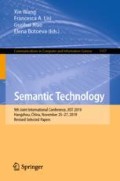Abstract
With the development of measuring instruments, life science databases are becoming larger and more heterogeneous. As a step towards providing integrated databases, many life science databases have been published as Linked Open Data (LOD). To utilize such databases efficiently, it is desirable that the schema, such as class–class relations, can be acquired in advance from SPARQL Protocol and RDF Query Language (SPARQL) endpoints. However, a SPARQL query to obtain the schema from a SPARQL endpoint often fails because it is time consuming and places an excessive load on the server. On the other hand, many datasets include the definitions using standard vocabularies, such as RDF Schema 1.1 and OWL 2. If the database schema is properly described and provided using RDF Schema 1.1 or OWL 2, it is no longer necessary to obtain it by exhaustively crawling the SPARQL endpoints. Therefore, we investigated the extent of the schema definitions in life sciences databases, focusing on seven specific patterns related to properties using RDF Schema 1.1 or OWL 2. We found that for some datasets, the patterns of domain and range definitions using RDF Schema 1.1, are relatively well defined for properties. However, there are few patterns using OWL 2 as schema definitions for properties. Additionally, we validated RDF datasets by restricting the patterns of domain and range definitions of RDF Schema 1.1. Subsequently, we found that RDF datasets follow these restrictions.
Access this chapter
Tax calculation will be finalised at checkout
Purchases are for personal use only
References
Yamaguchi, A., Toh, H.: Implementing LOD surfer as a search system for the annotation of multiple protein sequence alignment. In: Ichise, R., Lecue, F., Kawamura, T., Zhao, D., Muggleton, S., Kozaki, K. (eds.) JIST 2018. LNCS, vol. 11341, pp. 418–426. Springer, Cham (2018). https://doi.org/10.1007/978-3-030-04284-4_29
RDF Schema 1.1. https://www.w3.org/TR/rdf-schema/
OWL 2 Web Ontology Language Document Overview. https://www.w3.org/TR/owl2-overview/
Yamamoto, Y., Yamaguchi, A., Splendiani, A.: YummyData: providing high-quality open life science data. Database 2018(1), bay022 (2018)
Polikoff, I.: From OWL to SHACL in an automated way. https://www.topquadrant.com/2018/05/01/from-owl-to-shacl-in-an-automated-way/
Life Science Database Archive. https://dbarchive.biosciencedbc.jp/
eagle-i. https://www.eagle-i.net/
Acknowledgments
This work was supported by JSPS KAKENHI grant numbers 17K00434 and by the National Bioscience Database Center of the Japan Science and Technology Agency. We also acknowledge the participants of the NBDC/DBCLS BioHackathon 2019, who participated in a discussion on a validation method.
Author information
Authors and Affiliations
Corresponding author
Editor information
Editors and Affiliations
Rights and permissions
Copyright information
© 2020 Springer Nature Singapore Pte Ltd.
About this paper
Cite this paper
Yamaguchi, A., Kushida, T., Yamamoto, Y., Kozaki, K. (2020). Investigating Schema Definitions Using RDFS and OWL 2 for RDF Databases in Life Sciences. In: Wang, X., Lisi, F., Xiao, G., Botoeva, E. (eds) Semantic Technology. JIST 2019. Communications in Computer and Information Science, vol 1157. Springer, Singapore. https://doi.org/10.1007/978-981-15-3412-6_14
Download citation
DOI: https://doi.org/10.1007/978-981-15-3412-6_14
Published:
Publisher Name: Springer, Singapore
Print ISBN: 978-981-15-3411-9
Online ISBN: 978-981-15-3412-6
eBook Packages: Computer ScienceComputer Science (R0)

